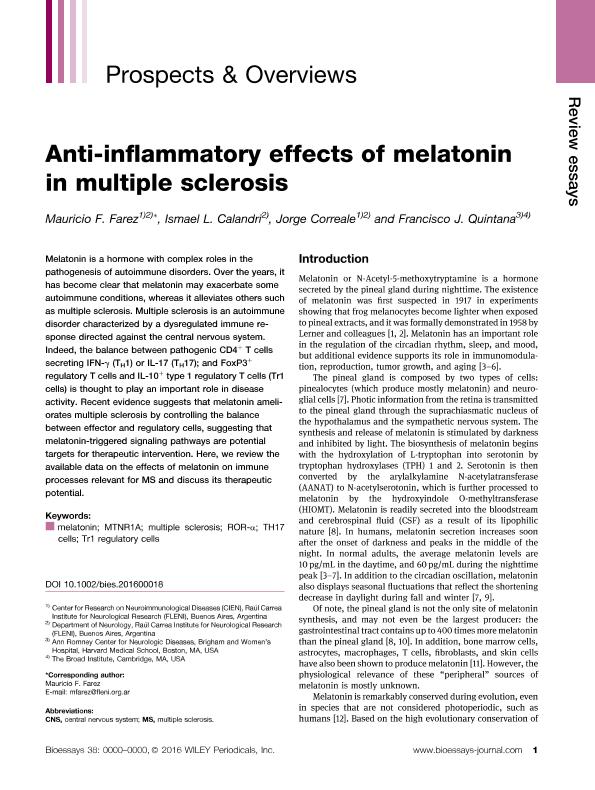Artículo
Anti-inflammatory effects of melatonin in multiple sclerosis
Fecha de publicación:
10/2016
Editorial:
John Wiley & Sons Inc
Revista:
Bioessays
ISSN:
0265-9247
Idioma:
Inglés
Tipo de recurso:
Artículo publicado
Clasificación temática:
Resumen
Melatonin is a hormone with complex roles in the pathogenesis of autoimmune disorders. Over the years, it has become clear that melatonin may exacerbate some autoimmune conditions, whereas it alleviates others such as multiple sclerosis. Multiple sclerosis is an autoimmune disorder characterized by a dysregulated immune response directed against the central nervous system. Indeed, the balance between pathogenic CD4+ T cells secreting IFN-γ (TH1) or IL-17 (TH17); and FoxP3+ regulatory T cells and IL-10+ type 1 regulatory T cells (Tr1 cells) is thought to play an important role in disease activity. Recent evidence suggests that melatonin ameliorates multiple sclerosis by controlling the balance between effector and regulatory cells, suggesting that melatonin-triggered signaling pathways are potential targets for therapeutic intervention. Here, we review the available data on the effects of melatonin on immune processes relevant for MS and discuss its therapeutic potential.
Palabras clave:
Melatonin
,
Mtnr1a
,
Multiple Sclerosis
,
Ror-Α
,
Th17 Cells
,
Tr1 Regulatory Cells
Archivos asociados
Licencia
Identificadores
Colecciones
Articulos(SEDE CENTRAL)
Articulos de SEDE CENTRAL
Articulos de SEDE CENTRAL
Citación
Farez, Mauricio Franco; Calandri, Ismael L.; Correale, Jorge; Quintana, Francisco J.; Anti-inflammatory effects of melatonin in multiple sclerosis; John Wiley & Sons Inc; Bioessays; 38; 10; 10-2016; 1016-1026
Compartir
Altmétricas




